Dementia dogs offer physical and mood enhancing benefits for people with dementia
Dementia Dog is an innovative pilot scheme focused on training dogs to help and support people living with dementia.
The scheme is the product of a design project created by the Glasgow School of Art (GSA). Alzheimer Scotland commissioned the project which has received support and funding from the Design Council and the Scottish Executive.
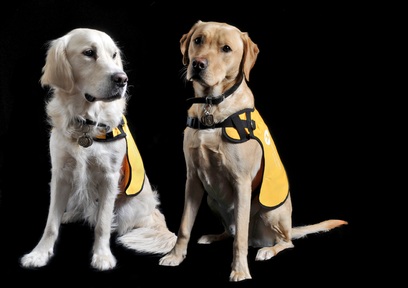
A team of experts in dementia care and assistance dogs from Alzheimer Scotland, The Glasgow School of Art, Guide Dogs UK and Dogs for the Disabled worked to launch the project as a pilot in 2012.
A carefully selected number of dogs have received specialist training to help family members and carers look after loved ones with dementia and try to improve their quality of life.
Head of Product design at GSA, Gordon Hush, said: "Dementia Dog sees graduates extending their skills beyond the traditional domain of material manufacture into the generation of experiences that improve the quality of life of both carers and those with dementia.
"The ability to re-design experiences is a significant challenge and one that these young designers have risen to in an extraordinary fashion."
'The collaboration has been inspirational and hugely beneficial to us'
The scheme was created as a result of the 2009 launch of the Department of Health’s, ‘Living well with Dementia’ strategy. On the receipt of extra funding and a successful research programme, Dementia Dog launched a small pilot scheme from the Guide Dogs for the Blind training centre in Forfar, Angus.
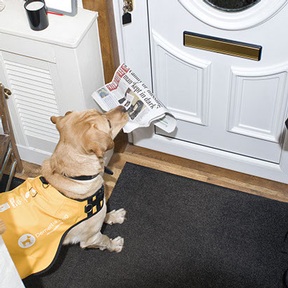
Chief executive of Dogs for the Disabled, Peter Gorbing said: “The collaboration has been very inspirational. The design process enabled us to think about our work in different and innovative ways and this has been hugely beneficial to us. The clear focus of the Challenge and the need to work to tight deadlines, has, I believe, brought out the best in each of the partners.”
The Alzheimer’s Society predicts there will be 850,000 people living with dementia in the UK this year and 1 million by 2025. Of those with dementia one sixth are aged 80 or over and 60 per cent are likely to be women.
There are more than 600,000 UK carers for people living with dementia and family carers save the UK economy £11 billion each year.
Dementia Dog has been devised to help family carers to care for their loved ones and help put their mind at ease when they cannot be there to help all of the time.
Director of training for Dogs for the Disabled, Helen McCain, said: "This new project has provided us with an opportunity to bring together our skills and experience to help with a different kind of challenge. We really believe that the dementia assistance dog could make a significant contribution to the Government's national dementia strategy."
Special considerations for each dog’s size, temperament and walking speed
In June 2013, a number of potential dogs were selected after receiving 18 months of training, and four were allocated to families, making special considerations for each dog’s size, temperament and walking speed for their families or partners.

Each dog has been taught to react to alarms, to nudge their owners to get up and out of bed each morning and bring them their medication.
The relationship between the fourth dog in the pilot scheme, did not progress and Vonn was retired from the pilot. The project will continue to monitor the progress of the three remaining assistance dogs and their lives with the families involved.
During 2013, one of the dogs in the pilot, Oscar was matched with Frank and Maureen Benham. Maureen has Alzheimer’s and is woken up each day by Oscar to ensure that she takes her medication.
’You meet people in the street and it’s a conversation starter’
Frank spoke about Maureen’s increased confidence since Oscar had started living with them. He said: “Maureen had lost confidence because she found it hard to hold conversations. Now they are out every day.
"You meet people in the street and it's a conversation starter, especially if Maureen knows them."
Frank acknowledged that Oscar is still a young dog who chews through a tennis ball once a fortnight and jumps on the bed with dirty feet, however when he wear his jacket, he is disciplined and knows he is there to help Maureen.
He added: "Before we had the dog, I did get frustrated, but the dog acts as a buffer between you. If it works out and eventually, down the line, it will be a normal thing for people with Alzheimer's or dementia to have a dog. I think it will be a fantastic achievement."
Golden Labrador Kaspa has been working with Ken and Glenys Will after Ken was diagnosed with dementia a five years ago and Glenys began caring for him.
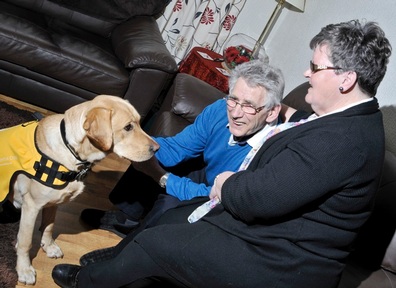
Of the four dogs that were placed with families, three are qualified as dementia assistance dogs and are living with people with dementia and their carers or families in Forfar. Families receive support from Alzheimer Scotland and Dogs for the Disabled and their progress is tracked to monitor the success of the pilot in practise.
Kaspa is trained to wake up Ken and Glenys, fetch medication when alerted by an alarm and other items for Glenys when required. Kaspa has helped make their lives easier, reassure Ken when he is alone and improved mobility issues for the couple.
’It’s like a big weight lifted off my shoulders’
Glenys said: "Kaspa has totally given us our lives back. Ken is much happier because he's got the dog and we can go out now. We can go shopping together, we can even go on holidays.”
"It's absolutely great, like a big weight lifted off my shoulders. Kaspa is the best thing that's ever happened to us. The first time we went shopping you could feel the stress go, we can go shopping and the dog will sit with Ken. I don't need to worry about him. "If I need the oven on, I'll leave a note beside the alarm in the kitchen. When the alarm goes off Kaspa nudges and nudges Ken until he's glad to get up. It's just amazing.
“We are a lot more relaxed since the dog came because if Ken gets in a mood and angry, the dog comes and nudges him and he forgets his problems.
"We've been married 48 years but often I've sat and looked at him and thought, 'I don't know who this person is' but now I've got a good bit of him back again."
Ken said: "I was tensed up and after two or three steps he just brushed against me and looked up as if to say, 'am I doing OK?' and the stress just went."
’Dogs have provided, practical, mood enhancing and emotional benefits’
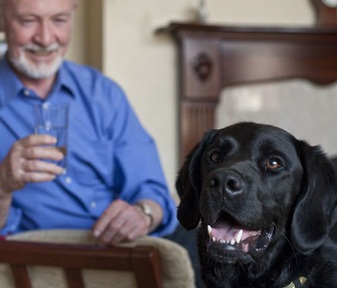
Dementia Dog gives people with dementia the opportunity to go out for walks together, and socialise with others in their community which they may have previously avoided without the company of a dog.
Logan Anderson works for Guide Dogs Scotland training school in Forfar. He said: "Our change-of-career guide dogs contribute invaluable work with other assistance dogs charities and the Dementia Dog pilot has shown, not just how the dogs have provided practical benefits to those living with Alzheimer's, but also the mood-enhancing and emotional benefits as well."
The dogs allow carers to spend less time checking and reassuring their partners and the dogs encourage a calm atmosphere for the person living with dementia.
Deputy director of development at Alzheimer Scotland, Joyce Gray, said: "Dementia Dog has had a truly wonderful impact on the families involved and Alzheimer Scotland is delighted to have been part of this ground-breaking project.
"Supporting people with dementia and their families to live well with the illness require innovative and imaginative approaches and the Dementia Dog team have brought all this and more to the project."
"Dementia Dog has had a truly wonderful impact on the families involved."
Alzheimer Scotland hopes to continue to work on the project for a national roll out. Dementia Dog is working towards a sustainable model of dog support programmes, working in collaboration with Dogs for the Disabled.
Future projects could include; Community dogs, who would be trained with the support of occupational therapists to help people with dementia to carry out their daily routines that they may have lost confidence to do. These include, visits out in their local community, to the library, hairdressers to allow them to maintain a regular exercise regime.
For more information on Dementia Dog, visit: http://www.dementiadog.org/
Latest Innovative Care News
 13-May-19
'Pink drink' brain cancer treatment rolled out across NHS in memory of Baroness Jowell
13-May-19
'Pink drink' brain cancer treatment rolled out across NHS in memory of Baroness Jowell
 25-Apr-19
Louis Tomlinson helps 83-year-old who lost wife to dementia complete bucket list
25-Apr-19
Louis Tomlinson helps 83-year-old who lost wife to dementia complete bucket list
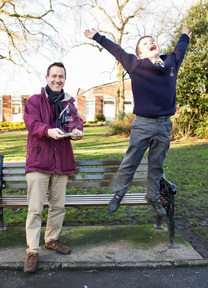 05-Mar-19
Care worker of the year inspires nine-year-old son to work in care
05-Mar-19
Care worker of the year inspires nine-year-old son to work in care
 12-Feb-19
Michael McIntyre's jokes tested to see if they stop elderly catching flu
12-Feb-19
Michael McIntyre's jokes tested to see if they stop elderly catching flu
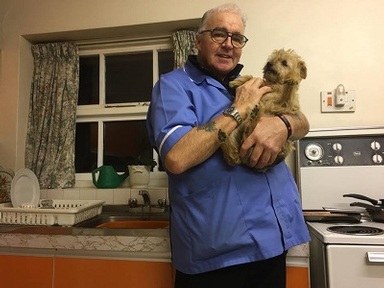 25-Jan-19
Ninety-year-old and his dog can stay together, thanks to care worker
25-Jan-19
Ninety-year-old and his dog can stay together, thanks to care worker